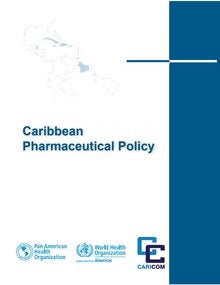Every human being is entitled to the enjoyment of the highest attainable standard of health conducive to living in dignity. Access to health care, which includes access to essential medicines, is a prerequisite for realising that right. National medicines expenditures, as a proportion of total health expenditures, currently range from 7% to 66% worldwide.
In the Caribbean, the implementation of the Revised Treaty of Chaguaramas and the establishment of the CARICOM Single Market and Economy (CSME) provide a favourable environment for regional integration. However, there are challenges in the area of health, given the health situation, geography, limited human resources and continued migration. At the same time, the tourism sector is being challenged by poor sanitation, untreated sewage that may damage beaches, food-borne disease outbreaks in public places, the threat of natural disasters and the need to mount an effective, rapid response to manage and control epidemics. There is a need to focus on achieving a strong, comprehensive and integrated public health response through health environment strategies that address these priority areas.
Recognising the challenge of ensuring sustained access to adequate quality medicines at affordable prices, the CARICOM Ministers of Health, at the Tenth Meeting of the Council for Human and Social Development (COHSOD) (April 2003), mandated the establishment of a Technical Advisory Group (TAG) on Trade-Related Intellectual Property Rights (TRIPS). TAG, by means of a regional assessment of drug regulatory and registration systems and a regional assessment of patent and related issues and access to medicines in CARICOM countries and the Dominican Republic, sought to assess the current situation and to propose solutions for improving the situation with respect to medicines. Complementary to these studies, PAHO/WHO published a report on the pharmaceutical situation in the Caribbean in 2007, with the participation of 13 Caribbean countries.
|

